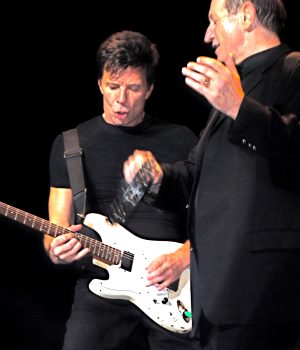
Jeff Neill is veteran lead guitarist for Streetheart, an epic Canadian band that, sadly, recently lost lead singer, Kenny Shields, to an unexpected passing. From the Gonzo Magazine archives, this 2012 interview with Neill shines a light on some of the bands history, perspective, and on the art of making good music.
Jeff was seven when he decided he would be a rock star. He made the decision immediately after his mother sat him down in front of the television to watch the Ed Sullivan show and told him about this band called the Beatles.
“Watching them on TV was about the closest thing to a religious experience I’ve had,” Neill say. “At the time I remember her saying that the Beatles were going to be on Ed Sullivan and all the girls were going to be screaming. I had no idea what to expect. Still viewing the world through the innocent lens of childhood, I thought somebody was going to be coming onto the show with these horrifying big bugs to scare the girls with. When I realized that this band from this England was on-stage and was the source of all the commotion, I knew right then that’s what I wanted to do.”
https://youtu.be/ceBLgwJb1Tw
Kenny Shields and Jeff Neill play Rolling Stones’ “Angie” live in-studio. Get the tissue out first.,
When the Beatles came on to the scene, the world had heard nothing like it. It was brand new and their music shook peoples notion of what music was and how it could make you feel. Shortly after Neill experienced his awakening, he would receive his first chunk of vinyl – a Beatles’ single sporting, She Loves You, on one side and, I Wanna Hold Your Hand, on the other.
Offering his perspective on the early days of the industry, Neill says though he misses the days of vinyl and fancy album covers, there is much to celebrate about the direction things are going.
“I thought somebody was going to be coming onto the show with these horrifying big bugs to scare the girls with. When I realized that this band from this England was on-stage and was the source of all the commotion, I knew right then that’s what I wanted to do.”
The music landscape is littered with departures and segues. As much as putting a band together relies on three or more people all agreeing on common goals and direction, Neill says it was not so much chemistry between them as it was a willingness to be brutally honest with each other; not so different than working in a business with other managers. The difference is, of course, that in a band you exist in close quarters with your partners, sometimes for months at a time with no real break. For Streetheart to still have a working relationship after all this time speaks volumes to the quality of character in the room.
“Call it nostalgia, but maybe there’s something more to it. Bands today continue to get better and better but less special in a way. Music was really special when we were kids. Today musicians have this entire library of knowledge to draw on at will. They can sit down at the computer and pull virtually any song – the same way a textbook at your fingertips is a valuable resource. “But,” Neill suggests, “its the way that musicians are interacting with that material that is different.
“The plus-side is it’s really an equal opportunity playing field. The talent still rises to the top, there are more opportunities for more talent to get noticed and do something interesting.”
“Back in the day, when Led Zeppelin came out with their second album, that was an important event. That was really something special. One kid in the neighbourhood got the record and the rest of us all got on our bikes and rode over there and sat around the record player. We were fascinated. We listened, I mean really listened and tried to figure out what these guys were saying. What are they doing? And what’s the meaning behind it? It was the same with any record at the time: Rolling Stones, Pink Floyd and others. The relationship with the music was deeper, more intimate, and informed part of the foundation of what we were doing. Then there was a sense of anticipation and mystery. Our only access to the music was on that one album. Today everyone has immediate access to everything.
Neill’s argument strikes at the root of a philosophical dilemma: that music today has shifted to being more about business than it is about art – perhaps arguably a logical result given the fact that in many ways, viability is measured by how much money people will throw at you. Guys like Woody Guthrie and Pete Seeger believed music was a powerful force for uniting people. Today there may be a lot of icing and not enough cake.
“How do we capture and keep some of that mystery that used to be there, that kept a smile on your face as you biked all the way home from the record store with the album you just spent your entire allowance on?” Neill says.
“For us, writing was always more or less a collective effort. One of us would bring an idea in – a melody line, a progression – and throw it in the mix… There are at any given time, hundreds of pieces of paper lying around with lyrical notations on them. I’m writing them all the time. I’ll even pull the car over if I have to.
“One of the biggest challenges is finding how the words are going to fit into the rhythm and how the melody will carry the words.”
“Writing songs that’ll stand out from the ocean of mediocrity and same-ness can be a daunting process. One of the biggest challenges is finding how the words are going to fit into the rhythm and how the melody will carry the words.” Ultimately, Neill says, it’s the feel of the song that drives the tone and feel of the lyrics and how the story is told.
“Music does emotionally and psychologically move people much the same way that music in soundtracks on films, directs your emotion to the picture. These early American folk singers were writing and playing songs for the people. I once watched a documentary where they showed a climax scene from a classic black and white Alfred Hitchcock horror. They showed the clip twice – once with music and once without. The effect was profound.
“The market has changed a lot over the last three decades. The days of an agent walking in and signing a band are gone. It was a challenge for established musicians to make adjustments when the bottom began to fall out of the old business model and the MP2 technology took over. Used to be there were fewer bands, longer life – now its seems more bands, shorter shelf life.”
In the end, Jeff agrees that the old guard is still there, only the money stream is less a river than a flood plain. Back then the money flowed into fewer hands. Now it’s as if the sides of the river have melted away and the river has busted into thousands of tributaries. “The plus-side is it’s really an equal opportunity playing field. The talent still rises to the top, there are more opportunities for more talent to get noticed and do something interesting.”
There’s a great quote on the website: Jeff Neill: “the most important things about being in a rock and roll band are to always remember where you come from, and, if you get lost…stop soloing and get back to the groove.”
It could be that in this new era of music and business, bands that continue to understand a little about the mystery of song, and play to the people instead of at them, will get noticed.








